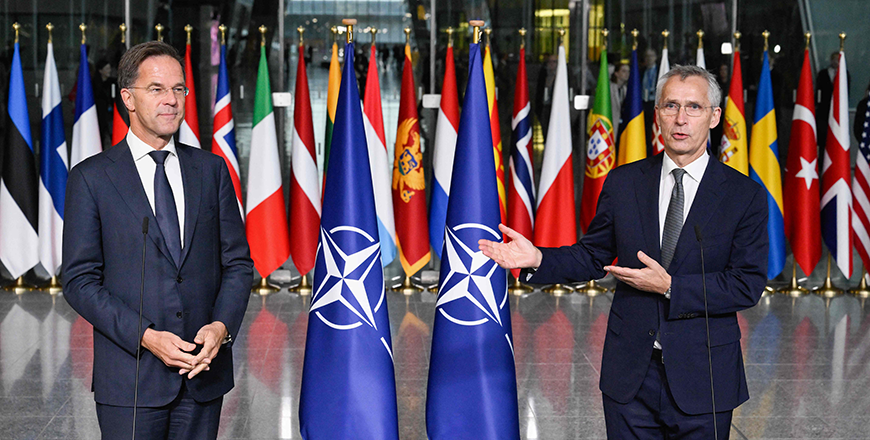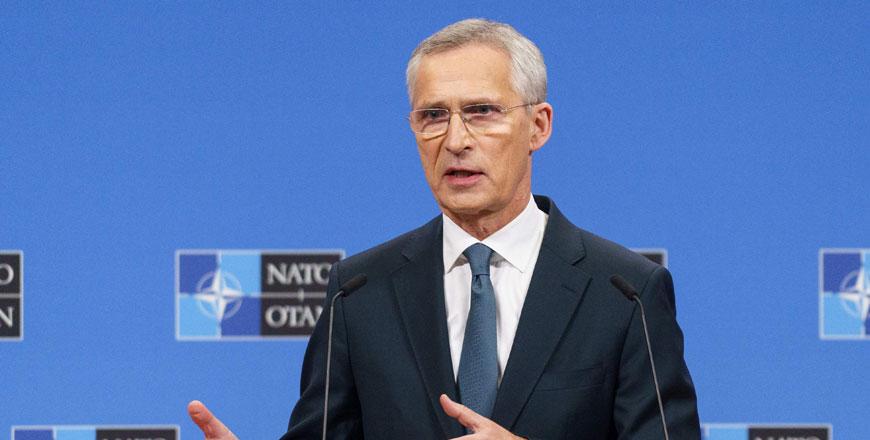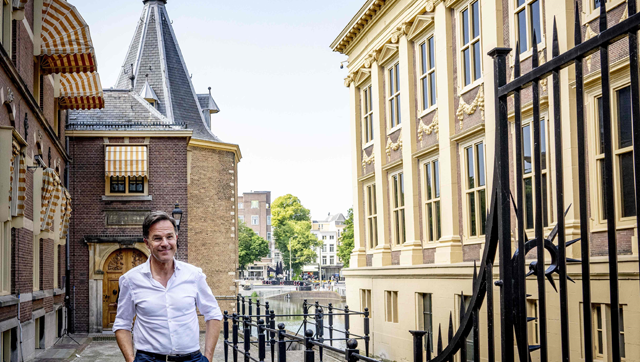You are here
New NATO chief Rutte dismisses Trump fears, vows Ukraine support
By AFP - Oct 01,2024 - Last updated at Oct 01,2024

NATO's new Secretary General Mark Rutte (left) listens to outgoing NATO Secretary General Jens Stoltenberg (R), addressing media during a handover ceremony at NATO headquarters in Brussels on Tuesday (AFP photo)
BRUSSELS, BELGIUM — NATO's new chief Mark Rutte on Tuesday downplayed fears over the impact of a potential Donald Trump victory in upcoming US elections and pledged to keep backing Ukraine, as he assumed leadership of the world's most powerful military alliance.
The former Dutch prime minister steps into the role at a pivotal moment, as Russia presses its war in Ukraine; China flexes its growing might, and just weeks before voters in the United States head to the polls.
"I'm determined to prepare NATO for the challenges of the future," Rutte said as he formally took over as secretary general from Norway's Jens Stoltenberg at NATO's Brussels headquarters.
The outcome of the November 5 vote is set to be the straight-talking 57 year old's first major test, and will shape his initial four-year term at the helm.
On the campaign trail, US former president Trump has threatened not to protect NATO members who do not spend enough on defence and promised to cut a quick deal with Russian President Vladimir Putin to put an end to the war in Ukraine.
"I'm not worried. I know both candidates very well. I worked for four years with Donald Trump. He was the one pushing us to spend more, and he achieved," Rutte said.
"I will be able to work with both, whatever is the outcome of the elections."
In opting for the veteran Dutch statesman, a staunch US ally and stalwart backer of Ukraine, NATO's 32 nations have picked a leader who will keep pushing support for Kyiv and efforts to bolster the alliance's own defences in the face of Russia.
"NATO will be in safe hands with you at the helm," said Stoltenberg, who has guided the alliance through one of its most tumultuous decades.
Rutte listed backing Kyiv as among his top priorities, along with ensuring NATO keeps on spending more on defence, and bolstering ties with partners including the European Union and those in the Asia Pacific.
No 'giving in' to Putin
"Putin has to realise that we will not give in, that we want Ukraine to prevail in the end," Rutte warned, saying he wanted "to step up our support for Ukraine and bring it ever closer to NATO".
"We must sustain this support into the future, because Ukraine's rightful place is in NATO," he added.
Ukraine's President Volodymyr Zelensky pledged to work productively with Rutte as his country "continues on its path towards full-fledged NATO membership".
But Kyiv is facing a difficult moment as Russian forces are advancing on the battlefield more than two-and-a-half years after the Kremlin's all-out invasion.
And there is uncertainty over future Western support for Ukraine and growing calls for a resolution to the conflict.
"It's up to the Ukrainian government to decide when they are at a stage that they want to discuss peace," Rutte said. "That's for later."
Rutte backed Ukraine's right to use Western supplied weapons inside Russia, but said it was up to each NATO ally to decide on any limitations.
'Spend more'
Another central task for Rutte will be to keep pushing NATO's members to carry on increasing spending on their militaries to counter any potential menace from Moscow.
Spurred on by the war in Ukraine, and pressure from Washington, European countries have already ratcheted up spending.
This year, 23 countries are set to reach NATO's target of spending two percent of gross domestic product on their militaries.
But with the threat from Russia expected to last for years, whatever the outcome in Ukraine, there is a clear understanding more will be needed.
"There is no cost-free alternative if we are to rise to the challenges ahead and keep our one billion people safe," Rutte said.
That could prove a tough sell for Rutte, who only saw the Netherlands reach the 2 per cent goal in his fourteenth, and final year in office.
As NATO has begun increasingly paying attention to China, Rutte reiterated the line taken at a summit in July that Beijing was a "decisive enabler" for Russia's war.
"China cannot continue to fuel the largest conflict in Europe since the Second World War without this impacting its interests and reputation," he said.
Even if he wanted to change NATO's direction, Rutte would likely struggle to shake up an alliance based on careful consensus between its members.
Stoltenberg, whose mandate was extended three times, trod a careful balancing act as NATO emerged reenergised in the face of Russia's aggression.
"One thing will not change, and that is NATO's core mission, and that is to make sure that we defend our people, our nations, and, of course, our values," Rutte said.
Related Articles
BRUSSELS, Belgium — Ukraine insisted on Tuesday that NATO membership was the only "real guarantee" for its security, but foreign ministers f
WASHINGTON — NATO's 75th anniversary summit was meant to showcase the triumph of a larger, stronger alliance.
BRUSSELS, Belgium — NATO’s 32 nations on Wednesday appointed outgoing Dutch Prime Minister Mark Rutte as the alliance’s next chief, handing
















